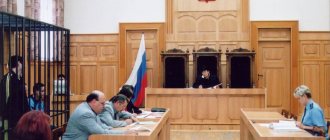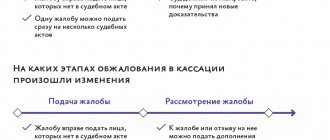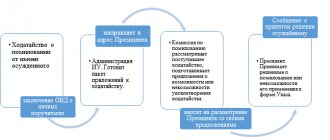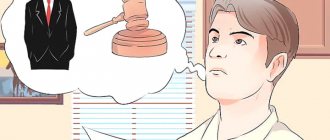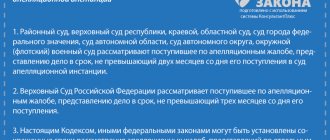Article 125 of the Code of Criminal Procedure of the Russian Federation. Judicial procedure for consideration of complaints (current version)
So, for example, in the Review of judicial practice of the St. Petersburg City Court on consideration of complaints under Art. 125 of the Code of Criminal Procedure of the Russian Federation for the first half of 2007, which was sent to the judges, is stated with reference to the “legal position of the Constitutional Court of the Russian Federation”, which are not subject to consideration in accordance with Art. 125 of the Code of Criminal Procedure complaints against “investigator’s decisions to refuse to satisfy various types of petitions.” Apparently, the authors of the Review proceed from the fact that refusal to satisfy petitions does not go beyond the scope of the procedural relations themselves, and violations committed in this case can be corrected during subsequent judicial review, therefore, the right to appeal in accordance with the above-mentioned decisions of the Constitutional Court of the Russian Federation and does not arise. At the same time, however, it is not taken into account that after the entry into force of the Code of Criminal Procedure of the Russian Federation, references to rather limited criteria for the admissibility of appealing to the court the actions and decisions of investigators, investigators and prosecutors at the pre-trial stages, formulated by the Constitutional Court mainly even before the adoption or entry into force of the Code of Criminal Procedure of the Russian Federation, in our opinion, are no longer relevant. According to Part 2 of Art. 79 FKZ dated July 21, 1994 N 1-FKZ “On the Constitutional Court of the Russian Federation” the legal force of the decision of the Constitutional Court of the Russian Federation declaring an act unconstitutional cannot be overcome only by re-adopting the same act. In this case, first of all, by the Resolution of the Constitutional Court of the Russian Federation of March 23, 1999 N 5-P, and after it and other decisions on the merits, the absence in the previous criminal procedure law of provisions on the right to appeal decisions and actions to the court was declared unconstitutional leading to violations of constitutional rights and freedoms, and assigning the task of considering such complaints to prosecutors. The current Code of Criminal Procedure of the Russian Federation does not overcome this provision by re-banning appeals; on the contrary, it develops the position of the Constitutional Court in a democratic direction. It is hardly legitimate to assume that the Federal Law “On the Constitutional Court of the Russian Federation” can deprive the legislator of the right to develop legislation along this path. Paragraph 2 of the Constitutional Court Resolution No. 5-P of March 23, 1999 also states that “the court, when checking during the preliminary investigation of certain procedural acts, SHOULD NOT PREJUDGE ISSUES THAT MAY SUBSEQUENT BE THE SUBJECT OF CRIMINAL PROCEEDINGS CASE (emphasis added - A.S.). Otherwise, it would be contrary to the constitutional principle of judicial independence...” In the Determination of June 20, 2006 N 240-O, as an example of a decision that is not subject to appeal under Art. 125 of the Code of Criminal Procedure provides, in particular, “the determination of the need to obtain and study new evidence, i.e. resolving those issues that in the future, after the prosecutor has transferred all the materials with the conclusion to the court, may become the subject of judicial proceedings to review the sentence.” However, one can hardly agree with such an interpretation. It is quite obvious that the court’s decision on the need to satisfy the requests of the participants in the process, primarily those related to the collection and verification of evidence, is in no way capable of predetermining issues that may subsequently become the subject of trial, since the verification of the legality and validity of the refusal of the investigative bodies to satisfy such petitions are in no way connected with the predetermination of issues affecting the essence of the criminal case (the issue of criminal liability). Taking into account the above, the opportunity that opens up for participants in legal proceedings to appeal against violations of constitutional law, formulated in the form of a ban on the use of judicial evidence obtained in violation of federal law (Part 2 of Article 50 of the Constitution of the Russian Federation) becomes of particular importance. In practice, this means that any investigative or other procedural action to collect and verify evidence can be appealed to the court on the grounds of violation of legal requirements during its implementation. Together with the right of the defense attorney to collect evidence (Part 3 of Article 86 of the Code of Criminal Procedure) and the right to appeal to the court the refusal of the preliminary investigation bodies or the prosecutor to satisfy requests, including the collection and inclusion of additional evidence in the case (Article 122 of the Code of Criminal Procedure), this is in significantly contributes to the adversarial equalization of the position of the prosecution and defense in the field of evidence during the preliminary investigation. However, often prosecutors and judges participating in court hearings to verify such complaints believe that appealing investigative actions and the admissibility of their results (evidence obtained) in accordance with Art. 125 is illegal, referring to the provisions of Part 4 of Art. 88 of the Code of Criminal Procedure, which talks about the right of the court to declare evidence inadmissible at the request of the parties or on its own initiative. Article 88, in turn, contains a reference to Art. Art. 234, 235 of the Code of Criminal Procedure, where we are talking about a preliminary hearing. Hence, it is incorrect, in our opinion, to conclude that the court has the right to consider this issue only during a preliminary hearing. Firstly, in Art. Art. 88, 234 - 235 refers to the consideration of the issue of admissibility of evidence only at the request of the parties or at the initiative of the court, and not in the order of appeal, i.e. in a different procedural situation and form. Secondly, part 4 of Art. 88 only requires the use of the procedure for declaring evidence inadmissible, provided for in Art. Art. 234 - 235 of the Code of Criminal Procedure, but by no means resolve this issue solely at the stage of scheduling a court hearing in the form of being brought to trial. This procedure, indeed, contains a number of special rules designed to most effectively resolve the issue of the admissibility of evidence (on the distribution of the burden of proving the admissibility of evidence, on the possibility of interrogating witnesses during the verification of the admissibility of evidence, other verification of evidence, etc.), however, these rules can (and should) be successfully used when a judge considers complaints raised during a preliminary investigation, since without them the assessment of disputed evidence may be difficult. In this regard, the arguments of some judges that the recognition of investigative actions and the results obtained in the course of them as illegal and unfounded in accordance with Art. 125 is impossible, since this requires additional verification and evaluation of evidence. A court hearing, including that provided for in the commented article, is always a form of administration of justice (clause 50 of Article 5 of the Code of Criminal Procedure), but could anything be more absurd than a denial of justice on the sole basis that it requires verification and evaluation of evidence?!
———————————
Resolution of the Constitutional Court of the Russian Federation of March 23, 1999 N 5-p “In the case of verifying the constitutionality of the provisions of Art. 133, part 1 art. 218 and art. 220 of the Code of Criminal Procedure of the RSFSR in connection with complaints from gr. VC. Borisova, B.A. Kekhmana, V.I. Monastyretsky, D.I. Fuflygin and limited liability company Monocom" // RG. 1999. April 15 N 72.
Determination of the Constitutional Court of the Russian Federation of June 20, 2006 N 240-O “On the refusal to accept for consideration the complaint of gr. Khoroshenko A.A. for violation of his constitutional rights, Part 1 of Art. 125 of the Code of Criminal Procedure of the Russian Federation.”
4. Part 1 of the commented article requires filing complaints with the district court at the place where the preliminary investigation was conducted. The latter is defined in Art. 152 of the Code of Criminal Procedure as a general rule as the place of commission of an act containing signs of a crime. Thus, the place of the preliminary investigation is not determined by the location of the preliminary investigation body, but only by the place where the act containing signs of a crime was committed. Consequently, as a general rule, a court considering complaints in accordance with Art. 125 of the Code of Criminal Procedure is determined, as a rule, by the place where such an act was committed, and not by the residence of the investigator, inquiry officer or prosecutor. However, the Code of Criminal Procedure of the Russian Federation does not give a direct answer to the question of how to determine jurisdiction in accordance with Art. 125, if the refusal to initiate a criminal case is appealed, when the preliminary investigation has not been started, which means it is impossible to determine the place of the latter’s proceedings. It seems that, according to the logical interpretation of part 1 comment. article, before the start of the investigation, the named general requirement to determine jurisdiction cannot be applied due to the fact that in this situation it is clearly unenforceable (absurd). In this case, of the two possible options, the most rational one must be chosen, when the decision to refuse to initiate a criminal case is appealed to the court at the official location of the body or official who made such a decision.
5. The Constitutional Court of the Russian Federation in its decisions has repeatedly pointed out the inadmissibility of limiting the right to judicial appeal of actions and decisions affecting the rights and legitimate interests of citizens, only on the grounds that these citizens were not recognized in the manner established by the Code of Criminal Procedure as specific participants in criminal proceedings ( suspects, accused, victims, etc.). Ensuring the constitutional rights and freedoms of man and citizen in criminal proceedings must follow from the actual position of this person as needing to ensure the corresponding right. For example, a person whose home was searched has the right to appeal the actions and decisions of the investigator that took place during the search to the court, despite the fact that he had not previously taken any part in this case. The defender of the suspect or accused or the representative of the victim must be allowed to participate in the court hearing, even if they have not previously taken part in the case.
———————————
Resolution of the Constitutional Court of the Russian Federation of March 23, 1999 N 5-p “In the case of verifying the constitutionality of the provisions of Art. 133, part 1 art. 218 and art. 220 of the Code of Criminal Procedure of the RSFSR in connection with complaints from gr. VC. Borisova, B.A. Kekhmana, V.I. Monastyretsky, D.I. Fuflygin and limited liability company Monocom" // RG. 1999. April 15 N 72.
See: Determination of the Constitutional Court of the Russian Federation of November 24, 2005 N 431-O “On the complaint of gr. Sablina O.V. for violation of his constitutional rights by part three of Article 125 of the Code of Criminal Procedure of the Russian Federation” // Bulletin of the Constitutional Court of the Russian Federation. 2006. N 2.
6. The applicant has the right to appeal in accordance with Art. 125 a decision made based on the results of consideration of a report of a crime, even if it is not formalized in the form of a resolution to refuse to initiate a criminal case (but has, for example, the form of a letter).
———————————
See: Determination of the Constitutional Court of the Russian Federation of January 25, 2007 N 135-О-О “On refusal to accept for consideration the complaint of gr. Rubtsova V.V. for violation of his constitutional rights by Article 124 of the Code of Criminal Procedure of the Russian Federation.”
7. In the manner prescribed by the commented article, a prosecutor’s decision to refuse to initiate proceedings due to new and newly discovered circumstances can be appealed (Resolution of the Constitutional Court of the Russian Federation of May 16, 2007 N 6-P, Resolution of the Constitutional Court of the Russian Federation of December 4, 2007 N 962-О-О, dated March 20, 2008 N 189-О-О).
8. If the complaint is unacceptable for consideration in accordance with Art. 125 (filed by an inappropriate person or the necessary subject of consideration is missing, etc.), then the court decides to leave the complaint without consideration and explains to the submitter the possibility of appealing this decision in cassation.
9. Filing a complaint does not suspend the production of the appealed action and the execution of the appealed decision, however, the body of inquiry, the inquiry officer, the investigator, the head of the investigation, the prosecutor or the judge has the right to do this either at the request of the interested party or on their own initiative.
10. During a judicial review of decisions, actions or inactions of an investigator, prosecutor, inquirer, the parties must be given the opportunity, both personally and with the help of lawyers representing their interests in court and other persons admitted to participate in the case, to become familiar with procedural documents affecting their rights and legitimate interests.
———————————
See: Determination of the Constitutional Court of the Russian Federation of March 24, 2005 N 151-O “On the complaint of gr. Vorzheva A.I. for violation of his constitutional rights by the provisions of Articles 29 and 161 of the Code of Criminal Procedure of the Russian Federation.”
11. The court must check not only the formal legality, but also the factual validity of the appealed decision of the preliminary investigation body (for example, on adding funds to the materials of the criminal case and recognizing them as material evidence).
———————————
Right there.
12. Clause 1 of Part 5 of this article provides for the court to issue a resolution not to cancel the appealed decision or action, but to recognize it as illegal or unfounded and on the obligation of the relevant officials to eliminate the violation. This is especially important for those cases when decisions to refuse to initiate a criminal case or to terminate it are appealed, since the cancellation by the court of such decisions would actually mean the initiation of a criminal case or the resumption of proceedings on it, which would make it contrary to the instructions of Part 3 of Art. . 15 of the Code of Criminal Procedure of the Russian Federation by a criminal prosecutor.
13. The start time of the court hearing is determined in part 3 of the commentary. The article is not clear enough: “No later than 5 days from the date of receipt of the complaint.” At the same time, it is not explained what moment is meant - the filing of a complaint with the court or with the judge who should consider it. It is no secret that in practice, from the moment a complaint is received by the court office until it is transferred to a specific judge, several days often pass. As a result, the 5-day period for consideration of the complaint is actually violated, but the parties cannot make claims against the judge to whom the complaint was received late. It seems that the specified period should be calculated from the date of receipt of the complaint specifically by the court as an institution (in the office of the court, etc.).
14. Part 3 of this article defines the circle of participants in the court hearing. This is the applicant and his defense attorney, legal representative or representative, if they are involved in a criminal case, other persons whose interests are directly affected by the appealed action (inaction) or decision, as well as the prosecutor. It seems that regardless of who files the complaint, the court must always notify the accused of the time and place of the court hearing, because according to the literal meaning of paragraph 19 of Part 4 of Art. 47 of the Code of Criminal Procedure, the law recognizes that any complaint in this criminal case directly affects his interests, because this provision does not require that copies of all complaints and submissions in this case be sent to the accused without exception. This is especially true for cases where the applicant of the complaint is not the accused (or suspect), but his defense lawyer. Failure to fulfill this obligation by the court should be regarded as a violation of the accused's right to defense and may lead to the reversal of the court decision. The accused or suspect held in custody must in such cases have the opportunity to be present at the court hearing.
The representative of the victim (and, apparently, also the civil plaintiff and civil defendant) should be allowed to participate in the court hearing in accordance with Art. 125 regardless of whether they previously participated in the preliminary investigation.
———————————
See: Determination of the Constitutional Court of the Russian Federation of November 24, 2005 N 431-O “On the complaint of gr. Sablina O.V. for violation of his constitutional rights by part three of Article 125 of the Code of Criminal Procedure of the Russian Federation” // Bulletin of the Constitutional Court of the Russian Federation. 2006. N 2.
By Order of the Prosecutor General of the Russian Federation dated September 6, 2007 N 136 “On the organization of prosecutorial supervision over the procedural activities of preliminary investigation bodies,” in order to objectively consider complaints, the prosecutor is ordered to ensure that the heads of investigative bodies receive the necessary materials to develop a legal position. When participating in a court hearing, give opinions on the appealed actions (inaction) or decisions of the investigator (head of the investigative body) using all materials available in the prosecutor's office.
15. Court hearing to consider complaints in accordance with Art. 125 is carried out openly, except for the cases provided for in Part 2 of Art. 241 Code of Criminal Procedure.
16. The commented article does not directly answer the question of whether the court, when considering a complaint, requests the entire criminal case or is limited only to those materials that the parties consider necessary to present. It also passes over in silence the question on the basis of what—evidence or non-evidentiary, including non-procedural (for example, operational-search) information—the court verifies the legality and validity of the appealed actions (inactions) and decisions. Before the adoption of the new Code of Criminal Procedure, the procedure for judicial verification of the legality and validity of the arrest was applied by analogy (Articles 220.1 and 220.2 of the Code of Criminal Procedure of the RSFSR), which provided for the person conducting the inquiry, the investigator and the prosecutor to send to the court not the entire case, but only selected materials confirming, in their opinion, the legality and validity of the actions being appealed. In practice, when considering complaints against the actions and decisions of preliminary investigation bodies, the court often requests the entire criminal case, since without examining all the materials of the case in their entirety, it is sometimes difficult to assess the authenticity of the materials presented (in copies), the legality or illegality of the complaint. Submitting the entire criminal case for verification of the complaint prevents delays in considering the complaint due to the incompleteness of the materials submitted by the preliminary investigation bodies. It should be taken into account that the court, as noted above, checks the legality and validity of the appealed actions (inaction) and decisions in a court hearing (parts 3 and 4 of Article 125 of the Code of Criminal Procedure of the Russian Federation), which is a procedural form of administering justice during pre-trial and judicial proceedings in a criminal case. It follows, firstly, that every court hearing has as its subject a criminal case, i.e. the court must request it from the investigative body, investigator and prosecutor before considering the complaint in court. Secondly, in a court hearing it is the evidence in the case that must be examined, because justice should not be content with just any other data when making a decision. It is usually possible to effectively verify the validity of most actions and decisions of an inquirer, investigator or prosecutor that affect the constitutional rights and freedoms of citizens only by examining the evidence that should be their basis, because only evidence must be recorded in the case file and have sufficient authentication power.
17. After the opening of the court session, explanation of their rights and obligations to those who appeared at the court session, and the applicant’s justification of his complaint against the decision, action or inaction of the inquirer, investigator or prosecutor, other persons who appeared at the court session are heard (Part 4 of the commentary article). In this case, it is possible to interrogate witnesses summoned at the request of participants in the court session.
———————————
Determination of the Constitutional Court of the Russian Federation of December 21, 2006 N 590-O “On refusal to accept for consideration complaints of gr. Machalaba N.N. for violation of his constitutional rights by Articles 125, 165, 182, 185, 186, 404, 406 of the Code of Criminal Procedure of the Russian Federation and Art. Art. 5, 9, 12 Federal Law “On operational investigative activities.”
The court has the right to double-check the actions of the investigator
On November 21, the Constitutional Court issued a ruling on the complaint of citizen Ch. about the unconstitutionality of the provisions of Art. 38 and 125 of the Code of Criminal Procedure of the Russian Federation. According to the applicant, they, by limiting a citizen’s ability to apply for judicial verification of the need to make a procedural decision against him to terminate or continue criminal prosecution, thereby deprive him of the right to rehabilitation in the future.
The reason for appealing to the Constitutional Court of the Russian Federation was the following situation: Ch. was detained on suspicion of committing a crime as part of a criminal case initiated on the basis of an accident that resulted in the death of a person, and was placed in a temporary detention center for three days. At the same time, an inspection and seizure of a car belonging to him was carried out, which was later recognized as material evidence. Subsequently, in this criminal case, forensic examinations were carried out with an examination of the seized vehicle, and Ch. was interviewed as a witness, but a decision to terminate his criminal prosecution was not issued, and the return of the car was refused by the investigator and the head of the investigative body.
In this regard, Ch. appealed to the district court under Art. 125 of the Code of Criminal Procedure of the Russian Federation with a complaint in which he asked to recognize as illegal the refusal to issue a resolution to terminate his criminal prosecution and to explain to him the right to rehabilitation, as well as to return the seized vehicle. The complaint was partially upheld: the investigator’s actions related to the refusal to return the car were declared illegal with the imposition of an obligation to eliminate the violations committed. The rest of the claims were denied. Motivating the decision, the court indicated that Ch. raised before the court the question of imposing on the investigator the obligation to perform a specific procedural action, which is contrary to Art. 38 of the Code of Criminal Procedure of the Russian Federation, according to which the investigator is authorized to independently direct the course of the investigation and make decisions on investigative and other procedural actions.
In its resolution, the Constitutional Court of the Russian Federation recalled that if the criminal prosecution of a suspect is terminated due to non-involvement in committing a crime, suspicion of a crime is removed from him and he has the right to rehabilitation. At the same time, the decision to release the detained suspect with reference to paragraph 1 of part 1 of Art. 94 of the Code of Criminal Procedure of the Russian Federation confirms the lack of sufficient data even to raise such a suspicion, which also serves as a reason for resolving the issue of terminating the criminal prosecution of such a person. “Otherwise, it would entail an unjustified continuation of the accusatory activities against this person, whose non-involvement in the crime is actually stated by the decision made, and a restriction of his rights,” the Court stated.
The resolution also notes that the absence of a procedural document indicating that the suspicion has been withdrawn and the criminal prosecution has been terminated can prevent the restoration of rights violated by criminal prosecution, making, in particular, the application of Art. 133 of the Code of Criminal Procedure of the Russian Federation on the grounds for the emergence of the right to rehabilitation. “The criminal procedural law determines only the initial moment from which a person becomes a suspect; the uncertainty of the legal status of this person in a situation of actual criminal prosecution - without its legal registration and, accordingly, without the provision of rights to protect against it - can persist until the expiration of the statute of limitations criminal prosecution,” recalls the Constitutional Court.
The Constitutional Court of the Russian Federation explained that a person who was detained on suspicion of committing a crime in accordance with Art. 91 and 92 of the Code of Criminal Procedure of the Russian Federation and after release from custody - in the absence of a procedural decision to terminate his criminal prosecution, and therefore procedural formalization of the termination of his status as a suspect - is interrogated as a witness, deprived of the opportunity to defend his violated rights, and therefore has the right to appeal to the court, the inaction of the investigator, expressed in the failure to make a decision to terminate his criminal prosecution, in the failure to ensure the implementation of the right to rehabilitation.
At the same time, due to the principle of adversarial behavior of the parties when considering complaints according to the rules of Art. 125 of the Code of Criminal Procedure of the Russian Federation, the court, recognizing the action (inaction) or decision of an official as illegal or unfounded and obliging him to eliminate the violation, is not empowered to independently cancel the decisions of the preliminary investigation bodies and the prosecutor, or to make other decisions in their place. “In this case, he would, to one degree or another, actually take part in the preliminary investigation, and therefore in the criminal prosecution, which is incompatible with the role of the court, as defined in the law,” the Constitutional Court of the Russian Federation clarified. However, this “does not prevent the court from assessing the legality and validity of the contested actions (inaction) or decisions.”
The resolution also noted that based on the results of consideration of the complaint in accordance with Art. 125 of the Code of Criminal Procedure of the Russian Federation, the court is obliged to make a decision, which must be legal, justified and motivated. “At the same time, the court should not limit itself only to fulfilling the formal requirements of the criminal procedure law and refuse to assess the factual validity of the contested actions (inactions) and decisions. Such an assessment naturally includes the power of the court to point out to the relevant body or official specific violations that they committed and which they are obliged to eliminate. Failure to fulfill this obligation may serve as a basis not only for appealing related actions (inaction) to the prosecutor or in court, but also for taking liability measures for failure to comply with a court decision,” the Constitutional Court of the Russian Federation explained.
Thus, the Constitutional Court ruled that the contested norms do not contradict the Constitution of the Russian Federation, since the provisions contained in them, in their constitutional and legal meaning in the system of current legal regulation, imply the authority of the court when considering a complaint of a person who, having been released from custody after being detained under suspicion of committing a crime on the basis of Art. 91 and 92 of the Code of Criminal Procedure of the Russian Federation, is interrogated as a witness without making a procedural decision to terminate his criminal prosecution, the inaction of the investigator, expressed in the failure to make a decision on the procedural status of this person, is allowed, including for the purpose of recognizing his right to rehabilitation and restoring the rule of law , the question of whether the investigator needs to make such a decision.
At the same time, the Court pointed out the need to review law enforcement decisions made against citizen Ch. on the basis of the provisions of Art. 38 and 125 of the Code of Criminal Procedure of the Russian Federation, in an interpretation that diverges from their constitutional and legal meaning identified in this resolution.
Deputy Managing Partner of AB FORTIS Vyacheslav Zemchikhin is confident that the defense will accept with hope the clarifications of the Constitutional Court of the Russian Federation on the right of the court to check the actions of the investigator if the criminal prosecution is not terminated. “In general, expectations from the decision of the Constitutional Court are high. One of the gaps in the legislation has been eliminated; the clarifications will serve as an additional basis for statements by persons against whom criminal prosecution or a criminal case is not terminated, when there is every reason for this,” the lawyer believes.
The expert explained that when initiating criminal cases and criminal prosecution of persons, there are cases of both hasty decisions and decisions with an interest. And then, unable to prove the guilt of the suspect or accused, the investigating authority tries to avoid admitting its mistake. This especially applies to situations where it is possible to recognize a person’s rights to rehabilitation and submit an appropriate application, for which the investigation decides not to terminate the criminal prosecution.
“In modern legal realities, courts are especially eager to consider another complaint in accordance with Art. 125 of the Code of Criminal Procedure of the Russian Federation cannot be observed. It is easier for the courts to find grounds on which it is possible to terminate the proceedings on a complaint or refuse to satisfy it, which is what we see in this case. The resolution of the Constitutional Court of the Russian Federation eliminates this loophole. This will help call the investigating body to order and bring clarity to the determination of the legal status of a person who, although he has acquired the status of a de jure suspect, is not de facto such,” concluded Vyacheslav Zemchikhin.
At the same time, the head of the MAA "ZAKON" Sergei Smishchenko believes that the importance of this resolution lies in a clear explanation of the meaning of the procedural law for the law enforcement officer, as well as in indicating the need for judges to make justified and motivated decisions.
He said that the procedure enshrined in Art. 125 of the Code of Criminal Procedure of the Russian Federation, he, as a practicing criminal lawyer, has an ambiguous attitude. And this is connected with two features of such an appeal. “Firstly, these are situations similar to the case considered: the court, having sufficient grounds to satisfy the applicant’s demands to recognize the investigator’s actions (inactions) as illegal in full, at best chooses what will cause the least damage to the prosecution system,” said expert. He added: at the same time, we must not forget that when carrying out this kind of control over the investigation, the court, as well as within the framework of the trial of the case on the merits, must observe the principle of adversarialism and not assume the functions of the prosecution. “The second feature - or more correctly, the complexity - is the execution of judicial decisions on complaints in accordance with Art. 125 of the Code of Criminal Procedure of the Russian Federation, which may drag on and become irrelevant or lead to new complaints about non-compliance,” stated Sergei Smishchenko.
The lawyer believes that often an appeal in this manner is not an effective remedy, and its outcome can easily go to the European Court of Human Rights.


